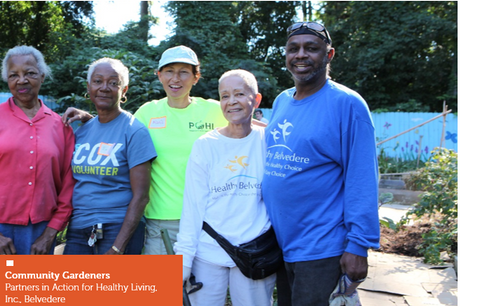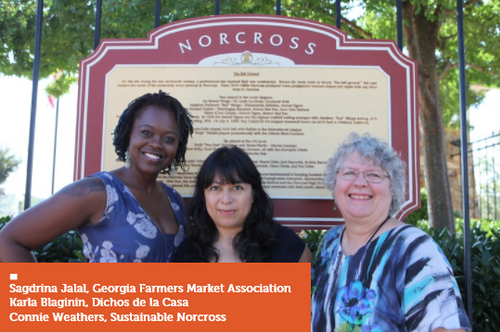
Building a Strong Community Identity & Spirit
By eating local, city dwellers connect with local farmers. And by growing food in their community they connect with neighbors in shared green spaces.

This map shows community gardens, urban farms and orchards clustered in “food deserts,” areas with low access to nutritious foods.
From Southwest Atlanta to Lilburn to North Marietta to Decatur, more than 400 community gardens across Metro Atlanta connect an estimated 8,000 citizens to their neighbors, mitigate food deserts, and encourage the vitality of urban neighborhoods.
More than 63 farmers markets are located in the five-county Metro Atlanta region, providing our city with growing access to healthy food and healthy social interaction.
Just blocks away from where Buford Highway – Atlanta’s multicultural commercial thoroughfare – passes through the City of Norcross, a crowd of adults and children gather at the Norcross Community Market. Some are browsing booths selling a variety of delicious, locally produced goods from fresh fruits and vegetables to honey and eggs. Some are tasting ready-to-eat treats such as arepas, tamales, and elote prepared by local food vendors. Others are participating in cooking demonstrations or simply enjoying live entertainment.


This market is unique in its appeal to the diverse communities that make up the city where more than 40 percent of residents are foreign-born, according to Sagdrina Jalal, Founder and Executive Director of the Georgia Farmers Market Association. Jalal’s organization developed the market in partnership with Sustainable Norcross and the City of Norcross.
In 2016, 56 percent of the market’s vendors were minority-owned by women, African Americans, veterans and non-U.S. born residents. When the number of Latino vendors increased, the market provided ServSafe trainings in Spanish to help sell prepared foods at the market.
The market is one of four in Metro Atlanta that accepts the Senior Farmers Market Nutrition Program vouchers issued to low-income senior citizens. For qualifying purchases and those of customers with SNAP (Supplemental Nutrition Assistance Program) EBT cards, each dollar spent is matched with a dollar added to the card. This double up program is provided through the market's partnership with Wholesome Wave Georgia and their Georgia Fresh For Less program.
The market works to strike the right balance in appealing to diverse communities; providing residents with access to healthy food; increasing sales for local, small-scale farmers and developing local entrepreneurs while bringing the community together around food, according to Connie Weathers, Founder of Sustainable Norcross.Through the market’s success, the Georgia Farmers Market Association and Sustainable Norcross have helped the City of Norcross understand the value of a farmers markets. “City support has been instrumental in making this possible through in-kind support. I know other farmers markets do not have support from local government, so it makes me appreciative of what we have,” says Weathers.



Food Well Alliance wants to hear from urban farmers, local food entrepreneurs and distributors about challenges and opportunities to scale and increase access to locally grown food.
Here is what we have heard from the community so far:
What are your ideas for removing these barriers?
• Farmers markets in Metro Atlanta struggle to attract demographically diverse shoppers and vendors.
• Because most farmers markets in Metro Atlanta are volunteer-led and unpaid, manager burnout and turnover is a major reason why markets fail.
• Sustaining neighborhood participation at community gardens is difficult because of lack of knowledge around volunteer management, community engagement and
access to funding resources.
• Growing development in Atlanta threatens available green spaces for community gardening.
Imagine if we worked together to make this happen in Metro Atlanta:
• More local governments following the example of the City of Norcross by creating farmers markets with free access to city-owned land and budgeted salaries for seasonal farmers market managers.
• More farmers markets using community-based engagement strategies to ensure that markets are inclusive of growers and shoppers of all ages, ethnicities and cultures.
• A centralized “go-to” association providing a place where community gardens could access tools, knowledge, city officials and other resources.
• Preserved green spaces, designated for community gardening in urban and housing development plans, resulting in more gardens and more people eating healthy local food.